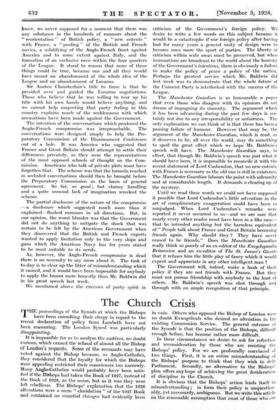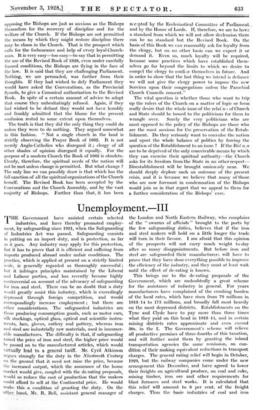The Church Crisis
rilHE proceedings of the Synods at which the Bishops 1 have been consulting their clergy in regard to the recent declaration of policy from Lambeth have not been reassuring. The London Synod was particularly disappointing.
It is impossible for us to analyse the motives, no doubt various, which caused the refusal of almost all the Bishop of London's requests. Some of the recusants may have voted against the Bishop because, as Anglo-Catholics, they considered that the loyalty for which the Bishops were appealing restricted their consciences too narrowly. Many Anglo-Catholics would probably have been satis- fied if the Bishops had taken the Book of 1927, instead of the Book of 1928, as the norm, but as it was they were left rebellious. The Bishops' explanation that the 1928 alterations were a mere " elucidation " of the 1927 Book and contained no essential changes had evidently been in vain. Others who opposed the Bishop of London were no doubt Evangelicals who desired no alteration in the existing Communion Service. The general outcome of the Synodg is that the position of the Bishops, difficult enough before, has become rather more difficult.
In these circumstances we desire to ask for reflection and reconsideration by those who are resisting the Bishops' policy. For we are profoundly convinced of two things. First, it is an entire misunderstanding of the Bishops' purpose to think that they wish to defy Parliament. Secondly, no alternative to the BiShops' plan offers any hope of achieving the great desideratum of discipline in the Church.
It is Obvious that the Bishops' action lends itself to misunderstanding ; in form their policy is unquestion- ably, Yet necessarily, ambiguous. But we Write this article On the reasonable assumption that most of those who are opposing the Bishops are just as anxious as the Bishops themselves for the recovery of discipline and for the welfare of the Church. If the Bishops are not permitted the means by which they might restore discipline there may be chaos in the Church. That is the prospect which calls for the forbearance and help of every loyal Church- man. It is very easy—too easy—to say that in permitting the use of the Revised Book of 1928, even under carefully framed conditions, the Bishops are flying in the face of the law. It is said that they are challenging Parliament. Nothing, we are persuaded, was further from their thoughts. If they had wished to defy Parliament they would have asked the Convocations, as the Provincial Synods, to give a Canonical authorization to the Revised Book. In spite of a certain amount of advice to adopt that course they unhesitatingly refused. Again, if they had wished to be defiant they would not have humbly and frankly admitted that the blame for the present confusion rested to some extent upon themselves.
The truth is that they did the only thing they could do unless they were to do nothing. They argued somewhat in this fashion. " Not a single church in the land is strictly observing the Prayer Book of 1662. It is not merely Anglo-Catholics who disregard it ; clergy of all other shades of opinion disregard it equally. For the purpose of a modern Church the Book of 1662 is obsolete. Clearly, therefore, the spiritual needs of the nation will not be met unless change is permitted. But what change ? The only line we can possibly draw is that which has the full sanction of all the spiritual organizations of the Church herself. The Revised Book has been accepted by the Convocations and the Church Assembly, and by the vast majority of Bishops. Further than that, it has been accepted by the Ecclesiastical Committee of Parliament.. and by the House of Lords. If, therefore, we are to hava a standard from which we will not allow declension there can be no standard but the Revised Book. On the basis of this Book we can reasonably ask for loyalty from the clergy, but on no other basis can we expect it or demand it. Even so, much loyalty will be required, because some practices which have established them- selves go far beyond the limits to which we desire to compel the clergy to confiae themselves in future. And in order to show that the last thing we intend is defiance we will not give the clergy power to impose the new Services upon their congregations unless the Parochial Church Councils consent."
The vital question is whether those who want to trip. up the rulers of the Church on a matter of logic or form really desire that the whole issue of the relat:o r of Church and State should be tossed to the politicians for them to wrangle over. Surely the very politicians who are most opposed to the policy of the Bishops are those who are the most anxious for the preservation of the Estab- lishment. Do they seriously want to convulse the nation and upset the whole balance of politics by forcing the question of the Establishment to an issue ? If the Bisl o)s are to be deprived of the only conceivable means by which they can exercise their spiritual authority—the Church asks for its freedom from the State in no other respect- Disestablishment will be brought ominously near. We should deeply deplore such an outcome of the present crisis, and it is because we believe that many of those who are now foremost in condemnation of the Bishops would join us in that regret that we appeal to them for a further consideration of the Bishops' case.



















































































































 Previous page
Previous page